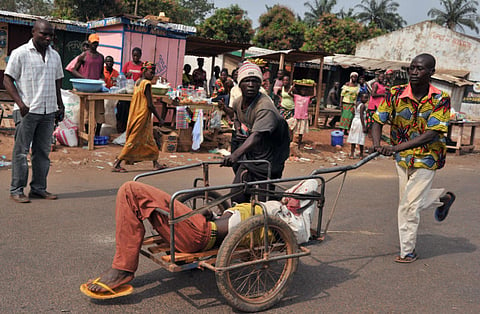Tryst with ‘Mother Courage’
Samba-Panza has a year to end the bloody sectarian strife in CAR

LONDON
When Barack Obama was elected US president in the depths of economic gloom, satirical news outlet “The Onion” carried the headline: “Black man given nation’s worst job.” The swearing-in last week of Catherine Samba-Panza as interim president of the Central African Republic (CAR) called to mind a sequel: “Woman given nation’s worst job.”
Even as Samba-Panza, wearing bright red, clutched the national flag and was saluted by a fanfare of trumpets in the heart of the capital, Bangui, its suburbs were going up in flames on a day that left at least 16 people dead.
The first female leader of CAR, and only the third in Africa, has inherited a hellish legacy that leaves her trying pull the country back from the brink of civil war.
The emphasis on her sex is no mere media contrivance. Many Central Africans say that a woman, and mother, is best placed to bring reconciliation. “Everything we have been through has been the fault of men,” Marie-Louise Yakemba, a civil society activist, told the New York Times. “We think that with a woman, there is at least a ray of hope.”
But “mother courage”, as she has been dubbed, takes on a state that has been barely functional since independence from France in 1960. Last March, the most recent of many coups brought a mostly Muslim rebel coalition to power over the majority Christian population, and conflict soon erupted.
With thousands dead and atrocities on both sides, UN officials warned that the cycle of reprisals was at high risk of degenerating into a genocide. Overwhelmed, Michel Djotodia, the country’s first Muslim president, walked away after nine dismal months.
Enter Samba-Panza, 59. Richard Dowden, director of the Royal African Society in the UK, said: “In a such a time you might expect a macho man to create a dictatorship and take control. Instead they elected a woman and it might be the answer.”
Why did the CAR, where the level of early and forced marriage is above 60%, choose a woman to save it?
Same old pattern
One answer is that nations often do in their hour of need. Minna Salami, a feminist commentator on Africa, said: “We can observe the same old patterns. It is historically and globally the case that women are more prone to access institutions traditionally reserved for men during crises, for example the second world war, Pan-African independence struggles, Burma, postwar Rwanda, Liberia. In that regard, it is no surprise that the CAR now has a female president. The country is facing a crisis and it is not simply Samba-Panza’s background but also her gender that is key.”
Samba-Panza was born in Chad to a Cameroonian father and a Central African mother, making her the “best example of regional integration”, she said in her 10-minute pitch for votes at the national transitional council. She went to university in France, where two of her three children still live; her husband, a former cabinet minister, is said to be suffering a debilitating illness.
Unanimous choice
A Christian, she has earned respect from both sides of the sectarian divide. In her victory speech last week, the new mother of the nation called on “my children” to lay down their arms and declared: “From today, I am the president of all Central Africans.” She cited her “sensibility as a woman” as a vital asset that could bring reconciliation.
“The Women in and Beyond the Global” website quoted her as saying: “Many people advised me that the time was not right for a woman. But it wasn’t only women who supported and pushed me. Many youth did as well. They wanted an end to the political man. I felt that.” In the eyes of many, including foreign donors, her ascent is the first thing to go right in the CAR for years.
Speaking from Bangui, Peter Bouckaert, emergency director at Human Rights Watch, said: “It is a step in the right direction to move away from people who seized power through the barrel of a gun to someone with popular support. She is widely respected for her integrity and people celebrated when she was elected.”
Her sex matters, he added. “I do think for many people on the ground it brings hope that she’s a woman because they’re tired of men with guns ruling over them. They believe she offers a realistic chance of reconciliation.”
Limited time
Samba-Panza will only be president for a year, however, as elections must be held by February 2015 and the interim leader is not allowed to stand. Until then the scale of the challenge is immense as the Christian majority now seems in the ascendant and African and French troops are struggling to keep the peace.
Bouckaert added: “Before long, there may be no Muslims left in the CAR. Just about every Muslim we’ve spoken to wants to leave the country.”
But, it is hard to know what should be top of the new president’s in-tray. David Smith, a director of Okapi Consulting, who spent several years in the CAR, said: “She’s starting with nothing. How long is the international community going to be interested? If history is anything to go by, not very long.”
Caesar Poblicks, of the London-based consultancy Conciliation Resources, said: “There is respect for her resilience because she decided to stay in Bangui but, without humanitarian assistance and law and order, it will disappear very quickly.”
— Guardian News & Media Ltd


